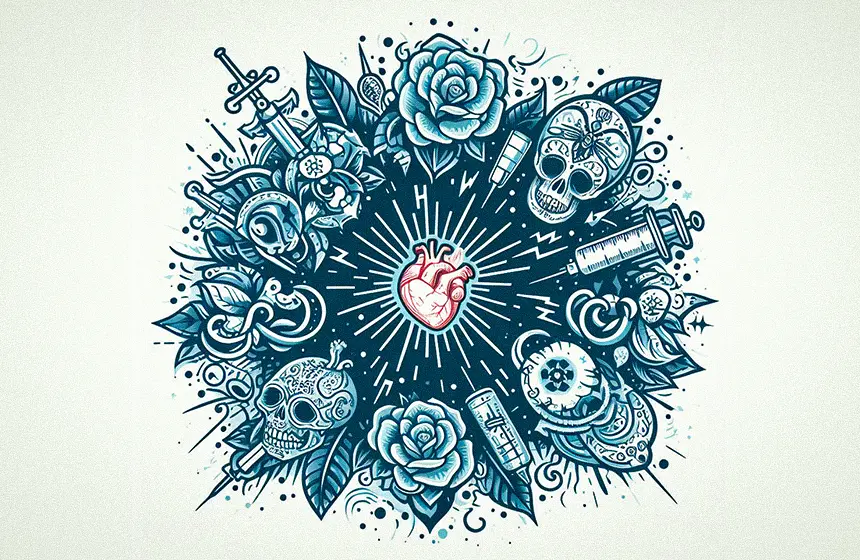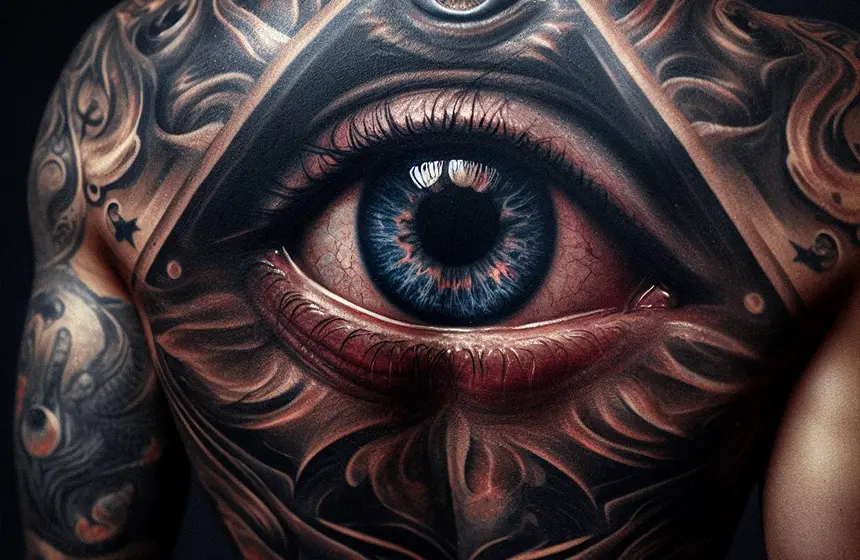In this comprehensive guide, we explore the potential risks of consuming alcohol before and after getting a tattoo.
This article serves as an essential resource for those considering body art. We explore the importance of nutrition, sobriety, and informed consent in the tattoo process and provide suggestions for optimal recovery.
Keep reading to learn how to make responsible decisions regarding your tattoo and alcohol consumption.
Table of Contents
Key Takeaways
- Drinking alcohol after getting a tattoo can interfere with the healing process and increase the risk of infection.
- Excessive drinking may lead to poor aftercare and neglect of proper cleaning and moisturizing of the tattoo.
- Alcohol can thin the blood, making it more prone to bleeding and potentially affecting the appearance of the tattoo.
- Following aftercare instructions and avoiding alcohol ensures proper healing and longevity of the tattoo.
Drinking After Getting a Tattoo: What You Need to Know

After getting a tattoo, it’s crucial to be mindful of alcohol consumption. Here’s what you should consider:
Avoid Alcohol Initially
In the hours immediately following your tattoo, it’s best to abstain from alcohol. Alcohol can thin your blood, leading to increased bleeding and potentially affecting the ink’s absorption.
Delayed Gratification
Waiting at least 24 hours before having alcohol is a wise move. This allows your body to begin the healing process.
Stay Hydrated
Instead of alcohol, focus on staying hydrated with water. Proper hydration promotes the healing of your tattoo.
Listen to Your Body
Everyone’s body responds differently to alcohol. If you do decide to drink, be cautious. Excessive alcohol can impair your judgment and lead to poor aftercare practices.
Careful Post-Drinking
If you do drink, ensure you’re in a condition to follow your tattoo aftercare instructions. Avoid exposing your fresh tattoo to excessive sunlight, swimming, or other irritants.
Consult Your Artist
Always consult your tattoo artist for personalized guidance on post-tattoo care, including alcohol consumption. They can provide insights specific to your tattoo’s size, placement, and overall health.
Impact of Alcohol on Tattooing
The consumption of alcohol has significant effects on the tattooing process.
Alcohol, a known blood thinner, increases the risk of excessive bleeding during the procedure. This can not only make the process more painful but also dilute the ink, affecting the vibrancy and longevity of the tattoo.
Alcohol’s dehydrating effects can result in dry skin, making it challenging for the tattoo needle to penetrate effectively, which may necessitate more painful repetition of lines.
Recommended Pre and Post-Tattoo Nutrition
Following the vital considerations regarding alcohol consumption and tattooing, it is equally crucial to discuss the importance of nutrition before and after the process to ensure optimal skin health and healing.
Optimal nutrition can help prepare your body for the stress of tattooing and enhance the healing process post-tattooing.
- Before Getting a Tattoo: Consuming a balanced diet rich in vitamins and minerals is essential. Foods like oranges, dark chocolate, broccoli, and blueberries are rich in antioxidants that can boost immune function and skin health. It is also important to hydrate by drinking plenty of water, which also helps maintain skin elasticity.
- During the Tattoo Session: Eating healthy carbs beforehand helps stabilize blood sugar levels, providing sustained energy. Avoiding alcohol is critical, as it can thin the blood, leading to excess bleeding.
- After Getting a Tattoo: Nutrition plays a key role. Foods rich in Vitamin C and A, such as tomatoes, aid skin preservation and damage protection. Hydration remains crucial, and adding elements like pineapple juice can enhance hydration and provide a youthful skin appearance.
The Necessity of Sobriety and Consent
While maintaining a healthy diet and proper hydration influences your tattoo experience, ensuring sobriety and providing informed consent when getting a tattoo is equally imperative. It is crucial to enter the tattooing process clear-headed and well-informed. Sobriety allows for effective communication of your tattoo preferences and decisions to the artist. This clarity ensures your tattoo reflects your true intention, not a spur-of-the-moment decision influenced by alcohol.
Informed consent is another essential factor. Tattoo studios require signed consent forms, including the agreement to not be under the influence of alcohol or drugs. This requirement is not solely about legality; it’s about respect for the art form and the professional providing the service.
Moreover, sobriety is vital post-tattooing as well. Drinking alcohol after the procedure can interfere with the healing process and increase the risk of infection. It may also lead to neglect of proper aftercare, affecting the longevity and appearance of your tattoo. In conclusion, embracing sobriety during this transformative journey is a testament to personal responsibility and respect for the artistic process.
Consequences of Post-Tattoo Drinking

Although indulging in a celebratory drink post-tattooing might seem tempting, it is essential to understand that alcohol consumption can significantly interfere with the healing process and longevity of your new tattoo. Alcohol is known to thin the blood, which can negatively affect the body’s ability to form a protective scab over the tattoo, thus increasing the risk of infection and prolonging the healing process.
- Increased Risk of Infection: Alcohol impairs the immune system, making the body more susceptible to infections. This can lead to complications such as redness, swelling, and pus around the tattooed area.
- Prolonged Healing Time: Alcohol’s blood-thinning properties can delay the healing process, leaving the skin irritated and inflamed for a more extended period. This not only prolongs discomfort but can also affect the visual outcome of the tattoo.
- Compromised Tattoo Quality: Excessive drinking might lead to poor aftercare, often resulting in faded colours and blurred lines. The longevity and appearance of a tattoo rely heavily on the care it receives in the initial stages of tattooing.
Critical Facts About Alcohol and Tattoos
It’s important to highlight key facts that underline why sobriety before and after the tattooing process is essential. Alcohol consumption can significantly impact the tattooing process. It thins the blood, leading to excess bleeding, delays the body’s healing process, and can compromise the quality and longevity of the tattoo.
Furthermore, alcohol-induced impaired judgment can negatively affect the communication with your tattoo artist and even potentially harm the reputation of the artist and studio. This is why reputable tattoo studios require signed consent forms explicitly stating that the client is not under the influence of alcohol or drugs.
After getting a tattoo, drinking alcohol can further interfere with the healing process and increase the risk of infection. Excessive drinking may lead to poor aftercare, neglect of proper cleaning and moisturizing, and potential damage to the appearance of the tattoo.
Frequently Asked Questions
How Long Should I Ideally Wait Before Consuming Alcohol After Getting a Tattoo?
It is advisable to abstain from alcohol consumption for at least 48 hours after getting a tattoo. This allows the body to heal effectively.
Are There Any Specific Types of Alcohol That Are More Harmful to the Healing Process of a Tattoo?
All types of alcohol can potentially disrupt the healing process of a tattoo by thinning the blood, impairing the immune system, and delaying healing. Therefore, it’s advisable to avoid all alcohol post-tattooing for optimal results.
How Does Alcohol Affect the Color Retention of a Newly Applied Tattoo?
Alcohol consumption post-tattoo can impact colour retention. It thins the blood, causing excess bleeding, which might lead to colour loss. Also, it disrupts healing, potentially affecting the overall vibrancy and longevity of the tattoo.
Can Drinking Alcohol After Getting a Tattoo Cause It to Fade Faster?
Drinking alcohol post-tattoo can potentially accelerate fading. Alcohol thins the blood, disrupts clotting and scabbing, and hampers the immune system, impacting the body’s healing process and possibly affecting the tattoo’s appearance and longevity.
Are There Any Exceptions to the Rule of Not Drinking Alcohol After Getting a Tattoo?
No exceptions are generally advised to the rule of avoiding alcohol after getting a tattoo. Alcohol can delay healing, increase the risk of infection, and potentially affect the tattoo’s appearance. Responsible aftercare ensures tattoo longevity.
Conclusion
Alcohol consumption before and after tattooing can hinder the healing process, impair judgment, and pose ethical and legal concerns. Maintaining sobriety, adequate nutrition, and hydration are critical for tattoo longevity and quality. Post-tattoo drinking can lead to adverse effects and compromised tattoo outcomes. Awareness and understanding of these risks are crucial for responsible decision-making in body art, underlining the significance of proper aftercare for successful tattoo healing.





